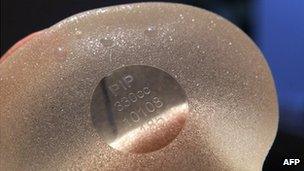PIP breast implants: UK government says 'no evidence' to remove implants
- Published

The implants were manufactured by the French company Poly Implant Prothese (PIP)
A government review into the rupture rate of banned PIP breast implants has, so far, found no evidence for removing them, according to the health secretary Andrew Lansley.
The review he ordered is due to report by the end of the week.
The implants caused a health scare after French authorities found a rupture rate of 5% and recommended implants were removed.
However, figures in the UK have suggested a much lower rate.
Mr Lansley told the BBC: "The overwhelming evidence continues to support the advice we've given women previously.
"It is not advisable for women to routinely have implants removed because the risk associated with an operation of that kind would outweigh the benefit of removing these implants."
Rupture rate unknown
The implants by the French firm Poly Implant Prothese (PIP) were banned in 2010 after they were found to contain industrial grade silicone gel, rather than medical grade and had an increased risk of rupturing.
However, data from the Medicines and Healthcare products Regulatory Agency (MHRA) suggested that the rupture rate was 1% - in line with other implants.
It led the chief medical officer for England, Prof Dame Sally Davies, to say before Christmas that: "We currently have no evidence to make us think they should have the PIP breast implants removed.
However, Mr Lansley ordered a review of rupture rates after conflicting data was submitted. Some reports suggested a rate of up to 7% in the UK.
The organisation which represents the majority of UK private breast implant clinics says the rupture rate of the banned PIP implants is not abnormally high.
The Independent Healthcare Advisory Services (IHAS) has submitted evidence to the investigation collected from thousands of patients with companies including Transform, The Harley Medical Group, Spire Healthcare, BMI Hospitals and The Hospital Group.
Its director Sally Taber said: "Following an audit of our members, which includes data on thousands of patients...we can confirm that the average rupture rates reported for PIP implants are within the industry standard of 1-2%."
About 40,000 British women have been fitted with the implants.
Never know
Tim Goodacre, president of the British Association of Plastic, Reconstructive and Aesthetic Surgeons (BAPRAS), said: "Even if the rate is 1-2% I am still concerned as that is higher than the normal rate."
Fazel Fatah, president of the British Association of Aesthetic Plastic Surgeons, said there were "many reasons for these figures not being reliable".
He said implants may have ruptured without the patient knowing or patients may have changed private clinicians or moved into NHS care if there was a problem.
"We do not know the exact rupture rate in the UK," he added.
The health secretary acknowledged that data from private companies had been "inconsistent" and was sometimes "inadequate" and of "poor quality".
He said he recognised it was a "worrying time" for women who had had PIP implants fitted and he said providers had responsibilities to their patients.
"For any provider not to fulfil those responsibilities would be unacceptable, " Mr Lansley said.
"Let me be absolutely clear, all affected women should be able to find out details of their implant free of charge.
"And I want every woman to be supported by the provider who treated them," he added.
This morning Mr Lansley held discussions with the chief medical officer, the Medicines and Healthcare products Regulatory Agency (MHRA) and Prof Sir Bruce Keogh, the NHS medical director who is to lead the review of the rupture rate data.
Sir Bruce said: "I expect all providers of surgical services to monitor their results.
"So I am disappointed at the ability of some private providers to submit accurate and meaningful data. I am pursuing this with vigour."
Prime Minister David Cameron's spokesman said: "We need to let Sir Bruce Keogh conduct the review before thinking about the next steps."
The full review group will meet tomorrow to discuss the preliminary findings. An announcement is expected by the end of the week.
Globally more than 300,000 implants are believed to have been sold to 65 countries by PIP over the last 12 years.
More than half of its exports went to South America.
- Published10 December 2013
- Published3 January 2012
- Published31 December 2011
- Published2 January 2012
- Published31 December 2011
- Published21 December 2011
- Published20 December 2011
- Published14 November 2010
- Published18 June 2010